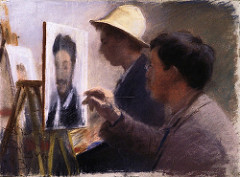Life is full of choices that overwhelm Parents and Teenagers alike- especially where careers and education are concerned. The struggle of choosing between your own “wants” and “needs” persists throughout life, but when students are trying to make these choices at such a young age, it can feel like an even larger conflict because they have to build their careers from scratch.
One of the matters often thrown on the back burner during these conflicts are hobbies and creative pursuits. How is drawing going to help with a tangible career? How can performing possibly supplement a future full of science or business? Why should I let my child mess around on a guitar when there is math to be done?
Our answers to this conundrum might lie where we least expect them: Nobel Prize winners. In this interesting parenting approach posited by The Atlantic, Professor Adam Grant mentions some statistics that really raise eyebrows. Nobel Prize Winners- in comparison to their less decorated peers- are far more involved in the creative realm. They are more likely to write fiction, engage in performing arts, or be skilled in music.
Why might this be? Well, at the end of the day, creativity is actually a form of problem-solving. Performing solves the problem of “How can I convey this in a way that is the most compelling?” Writing workshops the though “how can I communicate this thought is a way that leads the audience into the next since in a way that leaves them satisfied?” Music sharpens the skills that connect mental memorization with a physical memory that forces a new type of literacy in the performer- an alternative way of structuring information. These problem-solving situations carry over like a powerful and sightless wind into the other areas of our lives in a variety of unexpected ways.
For example, consider Einstein. We all know him as a mathematician, but it is not often discussed how he managed to be quite the violinist. Although he was initially forced to play violin, once he took it up on his own accord, he began to stimulate the parts of his brain involved in problem-solving in a new way. The interpretation of musical notes, The Atlantic explains, enabled Einstein to create one of his most memorable mathematical equations: e=mc^2.
So although Professor Grant’s parenting practices are debatable, I think the numbers in his justification tell a powerful message all their own. Let your kid learn music, or film, or illustration on the side- no matter how practical or rigid their career path appears. It might win them a fantastic award someday!







